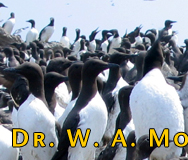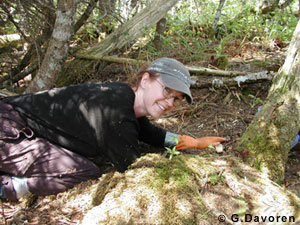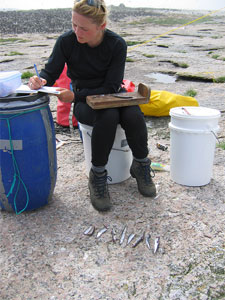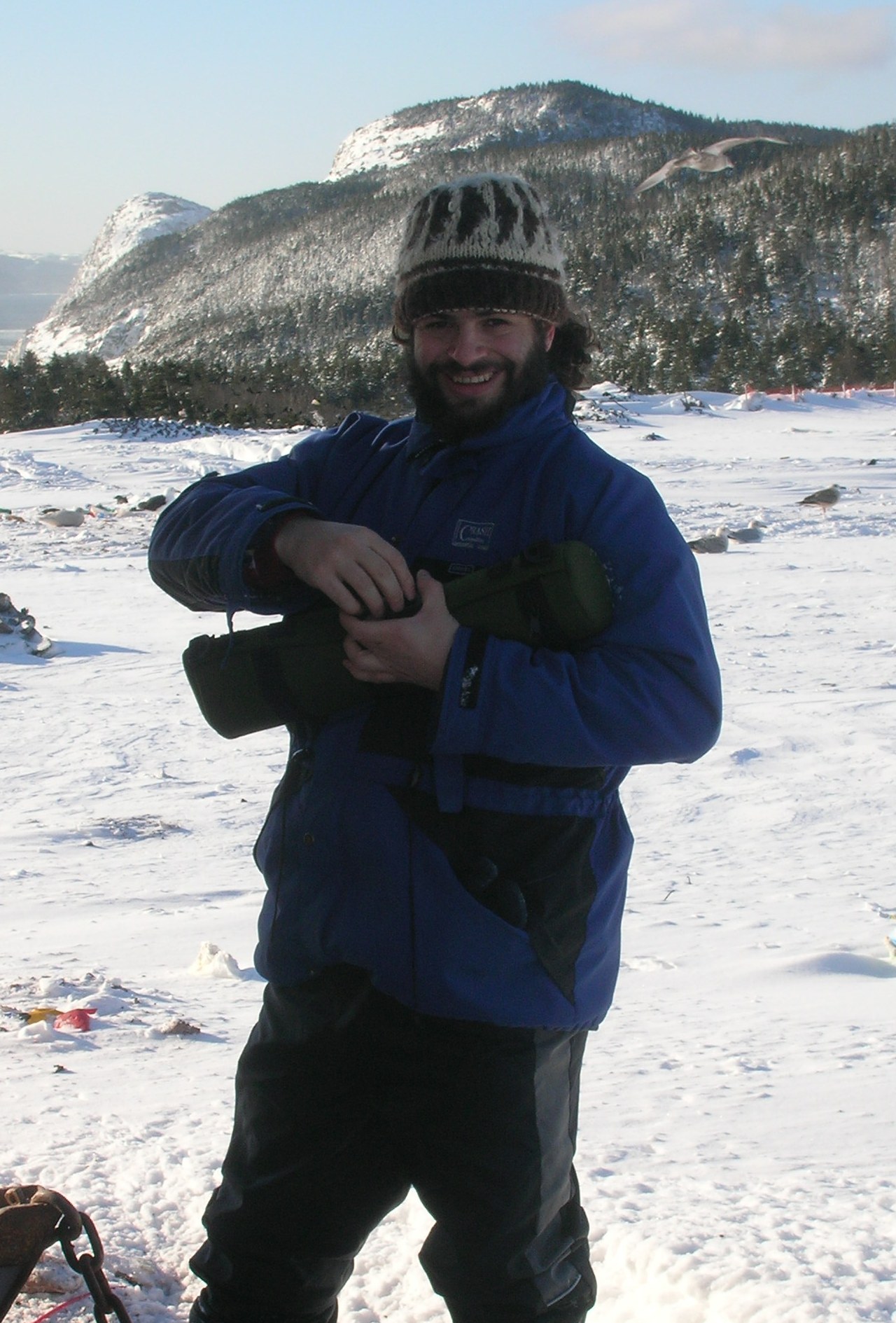

| home |
| research |
| international polar year |
| publications |
| public outreach |
| contact |
People
| April Hedd, Post
Doctoral Fellow
My research interests focus on the ecology and conservation of vertebrate predators and their role in marine ecosystems. Through field studies in the Southern Ocean, and on the west and east coasts of Canada I have investigated the ecology and behavioural strategies of a variety of seabirds to understand both natural and anthropogenic factors influencing reproduction and survival. During my doctoral research at University of Tasmania with Dr. Rosemary Gales, we used a variety of archival and telemetric devices to study the distribution and behaviour of Shy albatrosses at sea as a means of understanding their vulnerability to, and ultimately reducing rates of incidental capture in long-line fisheries. At the Centre for Wildlife Ecology at Simon Fraser University Dr. Douglas Bertram and I used long-term datasets to examine the influence of ocean climate variation on the foraging ecology and reproductive performance of planktivorous Cassin's auklets and piscivorous Rhinoceros auklets off the coast of British Columbia. Warm ocean conditions in the mid- to late-1990s apparently resulted in poor availability of key forage species, and this was expressed at higher trophic levels by poor seabird reproductive performance. As an NSERC Post-doctoral Fellow with Prof. Montevecchi at Memorial University, my current research focuses on ecology and distribution of Leach's storm-petrel, the most abundant breeding seabird in eastern North America. Despite its abundance, its small size (50 g), burrow nesting and nocturnal habits result in it being poorly known. We are using both conventional and chemical (stable-isotope) analyses to study the breeding ecology, diets and trophic relationships of Leach's storm-petrel throughout its annual cycle. In collaboration with the Canadian Wildlife Service in St. John's we have also initiated a long-term mark-recapture program in the Witless Bay Seabird Ecological Reserve. When combined within a framework involving piscivorous seabirds (see Prof. Montevecchi's page), we anticipate that our research with the planktivorous Leach's storm-petrel will shed light on mechanisms driving change within the Newfoundland Grand Banks ecosystem.
|
| Chantelle Burke,
Research Assistant; M.Sc. Student
I began as a research assistant with Dr. Montevecchi in 2000 after studying marine environmental studies at the Marine Institute (Memorial University of Newfoundland). During this time I became involved in research investigating the effects of oil and gas platforms on seabirds inhabiting the Grand Banks of Newfoundland. During 1999-2003, I conducted monthly surveys to offshore platforms on the Grand Banks to document the occurrence of seabirds on the Grand Banks throughout the year and to conduct independent monitoring to determine whether seabirds are being killed at offshore platforms. In 2004, I entered the M.Sc. program in Cognitive and Behavioral Ecology at Memorial under the supervision of Dr. Bill Montevecchi. Our research focuses on the foraging ecology of Common Murres and Atlantic Puffins in relation capelin availability in the Northwest Atlantic. I assess capelin availability using at-sea measurements (trawl and hydroacoustic) of the distribution, composition and abundance of prey over a meso-scale survey centered on Funk Island, the largest breeding colony in the Northwest Atlantic. Concurrent measurements of diet (via chick diets), foraging effort and chick condition are gathered at Funk Island to assess the responses of these two avian predators to changes in capelin conditions. This research is a component of a large, multi-disciplinary ecosystem project, supported by NSERC, investigating the importance of capelin in the Northwest Atlantic.
Chantelle's CV
|
| Dave Fifield, Canadian Wildlife Service;
M.Sc. Student
A native Newfoundlander, I received a B.Sc. in Computer Science from Memorial University of Newfoundland in 1987 and worked as a programmer and support technician for the university for seven years. In 1990, I became interested in birds and in subsequent years contributed to a variety of seabird research projects. I entered the M.Sc. program in Cognitive and Behavioral Ecology at Memorial in September 2004 under the supervision of Dr. Bill Montevecchi and Dr. Greg Robertson. Our research focuses on winter ecology of seabirds; the effect of colony and demographic variables on patterns and timing of winter movement, resource usage and geographical association. Although much is known about breeding season ecology of seabirds, we know relatively little about interactions with their environment during winter. Our investigations include the use of light-based geolocation loggers, stable isotope analysis and banding returns at Northern Gannet colonies on Bonaventure Island, PQ, Funk Island, NL and at Cape St. Mary's, NL. I am particularly interested in quantitative analysis and the efficient design of databases for ecological research.
|
| Paul Regular, Ph.D. Student
I grew up in the town of Hampden, Newfoundland, where my fascination with Newfoundland wildlife began. I spent much of my time outside observing local birds, fish and mammals, educating myself about their behaviour and interactions. Knowing that I wanted to work with wildlife, I moved to St. John’s and completed my BSc (Honours) degree in Biology at Memorial University of Newfoundland (MUN; 2002-2006). During my undergraduate, my interest quickly focused to seabirds after conducting my Honours research on auklet colonial behaviour under the supervision of Dr. Ian Jones on Buldir Island, Aleutian Islands, Alaska. After completing my B.Sc., I was hired by the Nature Conservancy of Canada (NCC) and Environment Canada (EC) to work on a research project dealing with common murre population and breeding trends at Cape St. Mary’s, Newfoundland. Dr. William Montevecchi and Dr. Gregory Robertson were my supervisors for much of this work, so it was a natural move after finishing my contract with NCC and EC to enter the PhD programme in Cognitive and Behavioural Ecology at MUN with Dr. Montevecchi and Dr. Robertson as my supervisors (2007). The nature of this program and the research focus of my supervisors allow me to nurture my interest in seabird behavior and ecology. Our research focuses on the foraging ecology of breeding Common Murres. I am specifically interested in contrasting the foraging strategies of Common Murres breeding at a large offshore colony (Funk Island, Funk Island Ecological Reserve) and a small inshore colony (Gull Island, Witless Bay Ecological Reserve). Oceanographic conditions and prey distributions at these colonies are drastically different. Consequently foraging tactics and food web dynamics may differ greatly at these two sites. We will compare the foraging tactics of Common Murres from both islands using bird-born activity recorders, colony based and vessel based observations. In the process of doing this exciting data heavy research, I have developed a keen interest in statistical analyses, and somewhere between making posters and power points, I have grown increasingly fond of graphic design.
|
| Alejandro Buren, Ph.D. Student
My research interests revolve around the understanding of the processes and mechanisms that structure and regulate natural communities. I am particularly interested in putting this knowledge to work for practical purposes, e.g. sustainable use of natural resources and conservation. My research involves evaluating the role of top predators in marine systems such as marine mammals, seabirds and large fish. I received a Licentiate in Biology degree from the University of Patagonia, where I studied the effects of fisheries using a large skate as a biological indicator of changes in the community. While in Patagonia, I also collaborated in projects devoted to the behavior and population dynamics of small cetaceans and sea lions. In 2005 I started my MSc at Memorial University, under the supervision of Drs Montevecchi and Koen-Alonso. My MSc thesis explored the relationship between prey availability and diet, using the common murre-capelin interaction as a case study. In 2007 I entered the PhD program in CABE, and my current research is trying to elucidate the potential effects that harp seals may have on the non-recovery of the cod stocks off Newfoundland, a topic as controversial as open to scrutiny. My PhD work involves developing trophodynamic models that puzzle together capelin, cod and harp seals, three key species in the Newfoundland marine community.
|
|
Laura McFarlane Tranquilla, Ph.D. Student
My research interests in avian ecology started while doing my BSc. at the University of New Brunswick, where I spent my summers studying songbird territory size in the blackfly-infested forests of New Brunswick. During this time, I was lucky enough to spend some time on Kent and Machias Seal Islands, where I was immediately captivated by the idea of working on seabirds. Since then, I have happily weathered remote fieldwork on rocky coastlines and stormy seabird islands, on both east and west coasts of Canada, catching and observing seabirds, sticking my arms into seabird burrows (up to the armpits in dirt) and have been chomped, scratched, and regurgitated upon by puffins, razorbills, murres, murrelets, auklets, and petrels. Fieldwork aside, my research interests are broadly centered on seabird ecology, physiology, and conservation. During my MSc. at the Center for Wildlife Ecology at Simon Fraser University, I studied breeding timing, egg production, and stress responses of Marbled Murrelets. Since finishing my masters, I have worked in association with the Canadian Wildlife Service managing seabird databases, and writing and editing scientific papers, technical reports, and handbooks discussing the ecology and biology of marine birds. I am delighted to be starting PhD studies in the Montevecchi lab at MUN in association with the IPY project. My research will focus on winter movement ecology of Thick-billed and Common Murres using data collected from tracking devices. I also plan to integrate winter movement ecology with trophic level associations and murre body condition.
Laura's CV
|
|
|
Bill Montevecchi's former students




